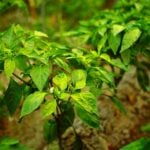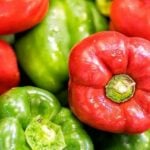Fertilizer is essential when it comes to
Maintaining healthy
Regardless of all these issues, horse manure is still one of the best but in its composted form. It’s certain that by now you’re already curious to know why horse manure is good for vegetable gardens. Let’s dive into more details about this information.
Is Horse Manure Good For Gardens?
Horse manure is often easily accessible in rural areas or you can obtain them from reputable suppliers. Hence, horse manure can indeed make a reasonable and inexpensive fertilizer. It’s even better if you’re not a fan of synthetic fertilizer as horse manure is purely natural.
Horse manure is one of the best options for your garden. It is rich in nitrogen, phosphorous, and potassium and these 3 nutrients are essential for the healthy growth of plants.

However, fresh horse manure shouldn’t be used right away but the composted form is better. Horses often have a hard time digesting what they eat.
Horse poop tends to have undigested organic components like grass, weed, and seeds in it. And this causes seaweeds to grow all over the garden when they use raw horse manure. This is why composting is recommended before use.
The process of making a compost pile is not an easy one but I promise you that your effort will be worth it in the end.
Read more about Can You Compost Chicken Bones And Turn Them Into Manure?
Horse Manure For Garden: Tips On Making Horse Manure Compost Pile
Composting is when naturally occurring microbes break down organic matter. Note that for horse manure to be finally called compost, it should look like a perfect
The idea is for it to have lots of roughage and a high level of nutrients. It will help make the
Making Horse Manure Compost Pile
Firstly, note that what can make all this possible is heat. Heat is what can help make a pathogen, seed weed-free compost. A byproduct of composting is heated. Getting and maintaining the level of degree that can help achieve this is a major hassle here.
A temperature of 100 degrees should do the trick. This is definitely achievable with consistency and a lot of trial and error.
Heap Formation
The pile will be in form of a heap. The heap should have everything necessary in the right quantity To achieve a perfect result and also to arrive at an answer to if horse manure is good for vegetable gardens. Make sure the heap is big enough. Air should be made possible to get to the heart and then composting can circulate through the air. The high heat is usually in the heart. Some old netting can be used.
To get a well-shaped pile with a bigger heart, form two different rings of 2cm each. Make sure the floor is bare; don’t use any coverings on the floor. Microbes and worms will be able to make their way into the heap to do their continuous work of composting.
That being said, you can go ahead and fill one of the rings with horse manure and other needed materials. The height of the heap you’re making should be about a meter. Your horse manure should go in first.
Let this first layer be about 15cm and make the surface even. Use a hose to spray water on the pile if it is dry to make it moist but not wet. You don’t want the composting process to be slowed down and all your effort in vain. The main focus is for the big heat to accumulate in the heart of your pile. This can be achieved when everything goes well. Sprinkle a handful of the general-purpose fertilizer on your pile.
Nitrogen And Green Matter
Nitrogen is needed for effective composting but in moderation. Then the green matter is next to go in. The green matter must be about 50 percent of the heap.
Repeat the whole process but remember to check for moisture in the horse manure. You can increase microbes by sprinkling lime on your heap. It makes your compost less acidic.
Ventilation
Ventilation can be created by drilling about four holes in the middle with long sticks that can reach the base of the heap. Retain heat, and moisture and prevent rain from getting your heap soaked by using old clothing to cover your heap.
If this procedure outlined so far is being followed correctly, composting will begin and go on successfully.
Turn Your Compost
The compost needs to be turned in after 3 weeks. Transfer the heap into the second ring. Make sure the outer part is in the middle this time around. Water the heap if need be and repeat other procedures too. This way, composting will go around.
Is It Safe To Eat Vegetables Grown In Horse Manure
You might be wondering if it is safe to eat vegetables grown in horse manure. Remember the best way to use horse manure is to let it pass through the composting stage. By now, your question about knowing if horse manure is good for vegetable gardens should have been answered.
Using fresh horse manure straight away is very risky as it can burn your plants and it usually contains unwanted substances such as undigested grass, weed, seeds, and so on. Composting will also help the manure to undergo sterilization from unwanted microbes.
Therefore, the best thing is to let your horse manure go through the process of composting before use in your vegetable gardens.
Are you making use of manure tea from diluted horse poo as folia feed? If yes, avoid pouring them on plants that you’ll be harvesting to eat within a week. Ensure to wash consumable plants after harvest.

Can You Put Too Much Horse Manure In Your Garden?
Yes, it’s possible to apply too much horse manure in your garden. This may cause nitrate leaching. Therefore, always ensure you only match the application of horse manure to your crop’s demand.
What Is The Best Manure For A Vegetable Garden?
Horse manure remains one of the best for vegetable gardens but only in its composted form. Horse manure compost contains a high level of rich nutrients and roughage that looks like
It contributes to and improves the general well-being of the
How Do You Make Horse Dung Into Fertilizer Rust?
To successfully turn horse dung into fertilizer, build the optimum pile of dung that is three feet high. If the pile is too small, the heat you will need to apply will dissipate very quickly and will not reach the temperatures that you need to successfully compost.
Maintain constant airflow through your pile. This will help prevent odors, achieve high temperatures and complete the composting process in a short period.
Monitor the temperature and maintain it in the range of 50 – 100 °F. Increase the temperature gradually and then drop it to ambient over several weeks. Your temperatures should never exceed 160 °F as high temperatures may immobilize the microorganisms needed to carry out the decomposition process.
What Vegetables Do Not Like Horse Manure?
Vegetable root crops such as beets, carrots, radishes, and potatoes are particularly sensitive to adding horse manure. This is because it contains a high amount of nutrients that can burn plants if applied at high concentrations. Salad greens are another type of vegetable that can get burned or damaged by horse manure.
To avoid any negative impacts on your plants from using horse manure, make sure that it is well-composted or diluted with other materials that can tone down its potency.
How Long Does Fresh Horse Manure Take to Compost?
It takes about four to six weeks to turn raw stable waste into manure if you do it properly. It does however take some effort. To achieve this, you will need to maintain the right moisture content in your compost heap to provide the ideal environment for bacteria to carry out the composting. If you are not getting any rain and the pile is getting dry, spray it with a garden hose until the material is just damp and has the consistency of a wrung-out sponge. If you over-water by accident, simply add a heap of dried leaves to the pile.
Keep the heat up in the compost until it resembles dark brown garden
Be careful when compositing horse manure. Compost piles can easily catch on fire, so be careful to keep them away from buildings or any combustible materials.
How Much Nitrogen Does Horse Manure Have?
Undiluted horse manure contains low levels of nitrogen, about 1 to 2% dry weight. It supplies small amounts of nitrogen to the
What is The pH of Composted Horse Manure?
Horse manure is not as acidic or alkaline as would be expected. The actual pH of the manure depends varies according to the diet of the horse but will be somewhere in the range between 6.6 and 7.5.
Manure from horses that are fed grain-based diets tends to be more acidic, while those fed a more hay-based diet will produce alkaline or neutral manure.
The manure can become more acidic or more basic depending on how it is composted. It will become more acidic if it is composted in an oxygen-rich environment. The opposite will be true for oxygen-poor environments.
Conclusion – Is Horse Manure Good For Vegetable Gardens
Is Horse Manure Good For Vegetable Gardens?
From the clear illustration in this article, your question about if horse manure is good for vegetable gardens must have been answered.
So, the knowledge about horse manure being good for planting when it’s in its composted form can be shared with other people for them to know.
FAQ’s
What is the best manure for a vegetable garden?
The best type of manure for vegetables is compost. This is a mixture of plant material, including both organic and inorganic matter. Compost is made by mixing your kitchen waste with a small amount of sawdust or straw, then adding a handful of leaves, grass clippings and other organic matter. The whole mix is then left to rot over time.
If you use too much, you’ll need to add more fertilizer later, but if you don’t use enough, the plant will need to work harder at absorbing nutrients from the soil. A few shovelfuls should be plenty to get started.
Is all horse manure good for vegetables?
It’s best to get your manure tested first. That way if you do have an issue you can treat it before using it. I wouldn’t put horse manure in the garden directly. You can buy a horse manure spreader to spread it on the lawn, but if you’re trying to grow food or flowers it’ll need to go into the compost pile. I would avoid putting anything organic into a compost pile or worm bin as they will contain pathogens and disease causing organisms. It’s best to get your manure tested first. That way if you do have an issue you can treat it before using it.
How long before you can use horse manure?
If you are using horse manure for your garden, you should wait at least six months before you can start sowing your seed. This is because horse manure has a high nitrogen content and will leach too much nitrogen from the soil if it is applied in the first few weeks of the growing season. This is true even if you don’t fertilise your garden with manure.
How should I apply horse manure for my garden?
If you are going to use manure as a fertilizer, then it’s not a problem. Just mix with your regular fertilizers and apply like you would any other fertilizer.
Manure can be applied as a natural fungicide. It is one of the best natural fungicides. You can make a compost tea with manure by mixing 1 part manure to 5 parts water. Apply this tea to plants and weeds. It will prevent most fungus problems.
What is the maximum amount of manure per square foot we should apply to the garden?
I would say 1 cubic yard of manure per 20 square feet (or one cubic yard per 100 square feet). This assumes the bed is 10 feet wide and the rows are 3 feet apart. You could also calculate it as 1 cubic yard per 25 square feet.
If you have an average of 10 square feet per row, that’s 10 times as much manure per row than per square foot. If you want to grow a lot of veggies, you’ll need more than 1 cubic yard of manure per 20 square feet or 25 square feet. I would guess that you’d need at least 3 cubic yards per 20 square feet or 4 cubic yards per 25 square feet, just to have enough nutrients in the soil for the veggies to grow well.






